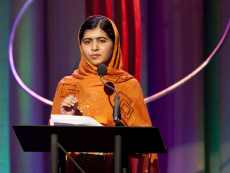
Malala Yousafzai, one of the most prominent individuals in the campaign for female education. At age seventeen, she has received the National Youth Peace Prize, the Simone de Beauvoir Prize, the Sakharov Prize, and most famously, shared the Noble Prize for Peace, (being the youngest ever recipient of the award). She has also published a biography, entitled ‘I am Malala: The Girl Who Stood Up for Education and was Shot by The Taliban’, in which she details her father’s campaign for supporting education for young women, the blog she began for the BBC website, and the attack on her school bus by the Taliban. Malala Yousafzai has become a symbol of courage and hope across the globe, and her shooting inspired a worldwide recognition of the right to education, and the right to be free from terror. It is especially important to note, I think, that a young, Islamic girl holds such a large amount of respect and recognition across the globe, as in a Western society, she is certainly a minority. She not only possesses significance for representing such a noble cause, but equally for demonstrating the power of many factions which people unjustly discriminate against.
Malala’s father, Ziauddin Yousafzai, was already recognised as a prominent activist for equal education in Pakistan. Ziauddin educated Malala, encouraging her political knowledge to blossom, and taking her with him to rallies. In 2008, they arrived at a press club, where she asked ‘How dare the Taliban take away my basic right to education?’. Later that year, the BBC had formulated an idea to demonstrate the horrific treatment of women by the Taliban, and their prevention of education of women. This was to ask a young Pakistani schoolgirl to write a blog about her life. Contacts were made, and eventually, Ziauddin suggested his daughter, to which the BBC agreed. She would write down her thoughts, and pass them to a reporter, who would scan and upload them. These would include the events, which she experienced, such as the Taliban taking over her area, the closing of the schools, and other such terrifying actions.
After the diary project was over, Malala moved on take part in a documentary, be interviewed on radio and television, and in October 2011 was nominated by Desmond Tutu (a prominent South African equal rights activist), for the international Children’s Peace Prize. More awards followed, her public recognition rising, and in October 2012, a Taliban Gunman attacked her. He boarded the school bus, demanding to known which girl was Malala, declaring that otherwise he would shoot them all. Once she courageously identified herself, she was hit with one bullet, which passed through her head, and neck.
Miraculously, Malala survived. After being airlifted to hospital, she travelled to the UK for further treatment, where she stayed in care until being discharged from the Queen Elizabeth Hospital in Birmingham three months later. Still continuing in her heroic bid for equal rights, she met with such prominent political figures as Barak Obama, and Queen Elizabeth II. On October 10, 2014, she was nominated for the Noble Peace Prize for her struggle against the suppression of children and young people and for the right of all children to education, being the youngest ever recipient of the award.
So that is why I believe Malala Yousafzai is an inspirational person. She has fought so diligently for equal education for young women, and done so without preaching hate. Not even an attempted assassination has prevented her from carrying on her cause, her actions demonstrating how truly valuable the tool of education is.
Sadly, since writing this article, there has been a sickening attack on a Pakistani school by a splinter terrorist group ‘Tehrik-i- Taliban’ in which over 130 children were killed. In a touching response, Malala stated that she was ‘heartbroken by this senseless, and cold-blooded act of terror’

0 Comment:
Be the first one to comment on this article.